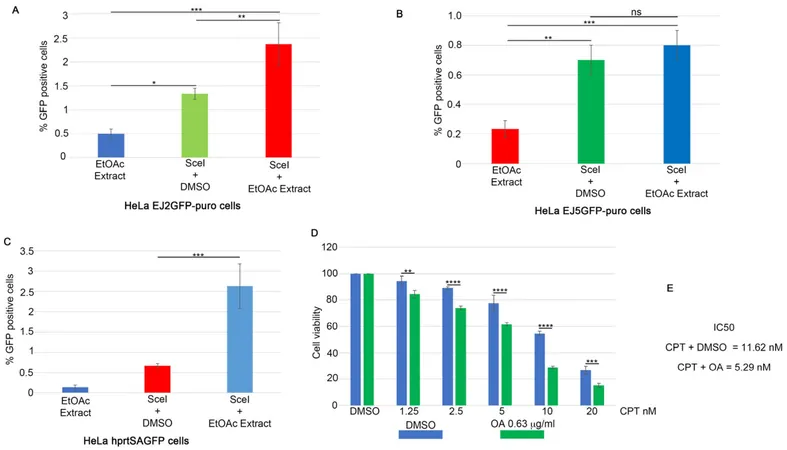
Revolutionary Grape Compound Could Enhance Chemotherapy Effectiveness—Here's How!
2024-12-30
Author: Arjun
Groundbreaking Discovery
In a groundbreaking new study, researchers have revealed that oleanolic acid, a natural compound found in grape pomace, could significantly enhance the effectiveness of chemotherapy by modifying the DNA damage response when used alongside the chemotherapeutic agent camptothecin. This discovery could pave the way for reduced dosages of traditional cancer drugs and mitigate their associated side effects, promising a brighter horizon for cancer patients.
Key Research Details
Published in the prestigious *International Journal of Molecular Sciences*, the study titled "Oleanolic Acid Modulates DNA Damage Response to Camptothecin Increasing Cancer Cell Death," is spearheaded by Prof. Antonio Giordano, a prominent figure in cancer research as Director of the Sbarro Institute for Cancer Research and Molecular Medicine at Temple University. Alongside him is Dr. Luigi Alfano from the Istituto Nazionale Tumori Fondazione Pascale in Naples, Italy. Their collaborative efforts are part of an innovative research initiative that aims to harness the power of natural extracts for cancer treatment.
Potential Benefits
This new breakthrough highlights the potential of oleanolic acid to serve as an adjunct to chemotherapy, allowing for lower doses of camptothecin without compromising its effectiveness. By utilizing Nuclear Magnetic Resonance (NMR) techniques, the research team confirmed that adding oleanolic acid to cancer cell lines not only enhanced their susceptibility to the chemotherapy but also reduced the concentration of camptothecin necessary to achieve a significant anti-cancer response.
Expert Insights
Prof. Giordano emphasized the implications of this research, noting that "the ability to lower the required concentration of chemotherapy drugs has the potential to lessen the adverse side effects, ultimately resulting in a more tolerable treatment experience for patients." This revelation is particularly crucial as many cancer treatments come with debilitating side effects that significantly impact patients' quality of life.
Continued Research
The research group, known for prior pivotal findings in molecular biology, has previously investigated various natural compounds, including capsaicin and its potential in treating mesothelioma. Their continuous efforts underscore an exciting trend in cancer research: the exploration of natural extracts as therapeutic agents.
Looking Ahead
With further clinical studies on the horizon, oleanolic acid could soon revolutionize the cancer treatment landscape, offering hope to millions of patients worldwide. Stay tuned as we continue to follow this promising research that could alter how cancer therapeutics are formulated and delivered. The future of cancer treatment might just be a grape-derived compound away!






 Brasil (PT)
Brasil (PT)
 Canada (EN)
Canada (EN)
 Chile (ES)
Chile (ES)
 Česko (CS)
Česko (CS)
 대한민국 (KO)
대한민국 (KO)
 España (ES)
España (ES)
 France (FR)
France (FR)
 Hong Kong (EN)
Hong Kong (EN)
 Italia (IT)
Italia (IT)
 日本 (JA)
日本 (JA)
 Magyarország (HU)
Magyarország (HU)
 Norge (NO)
Norge (NO)
 Polska (PL)
Polska (PL)
 Schweiz (DE)
Schweiz (DE)
 Singapore (EN)
Singapore (EN)
 Sverige (SV)
Sverige (SV)
 Suomi (FI)
Suomi (FI)
 Türkiye (TR)
Türkiye (TR)